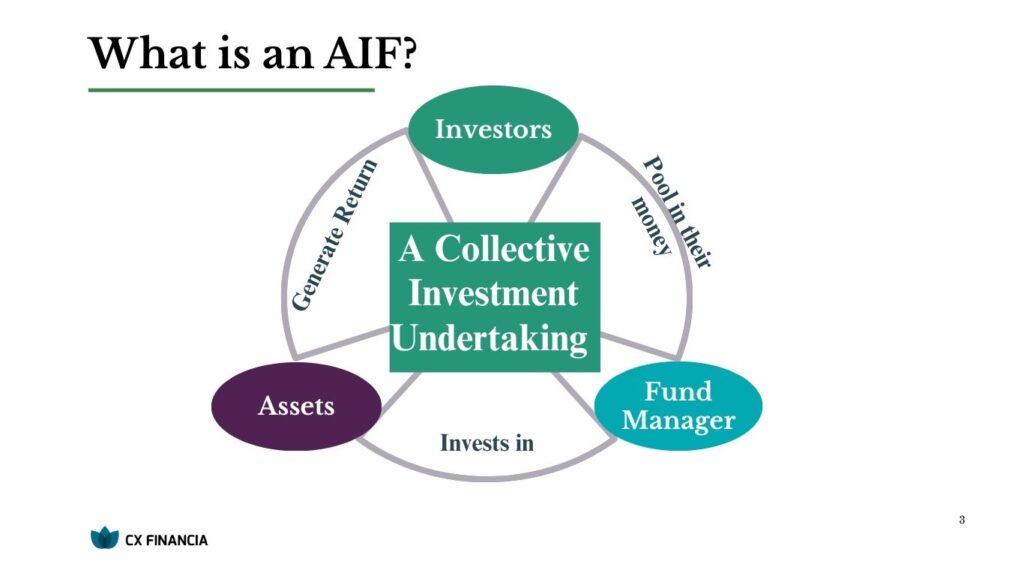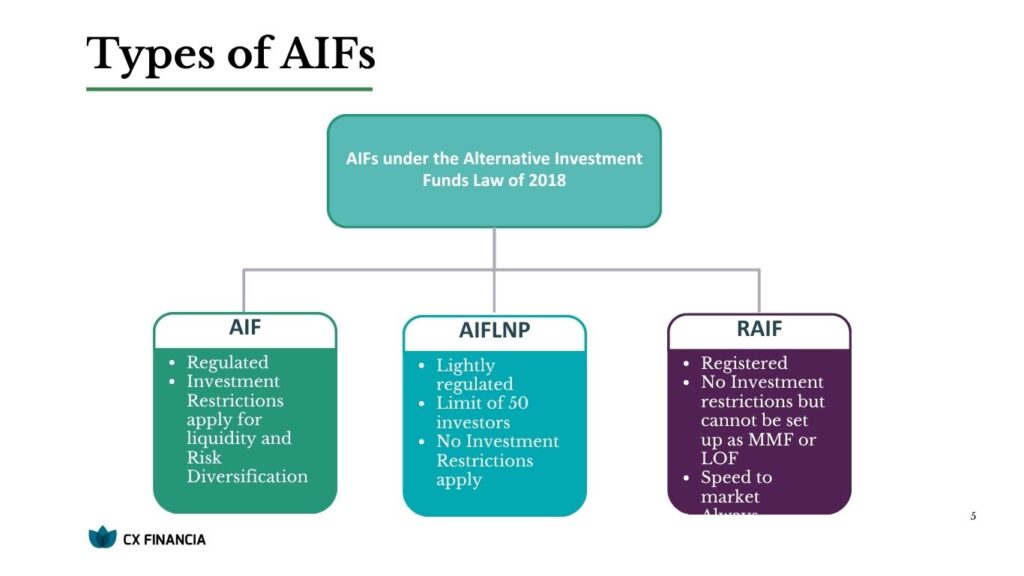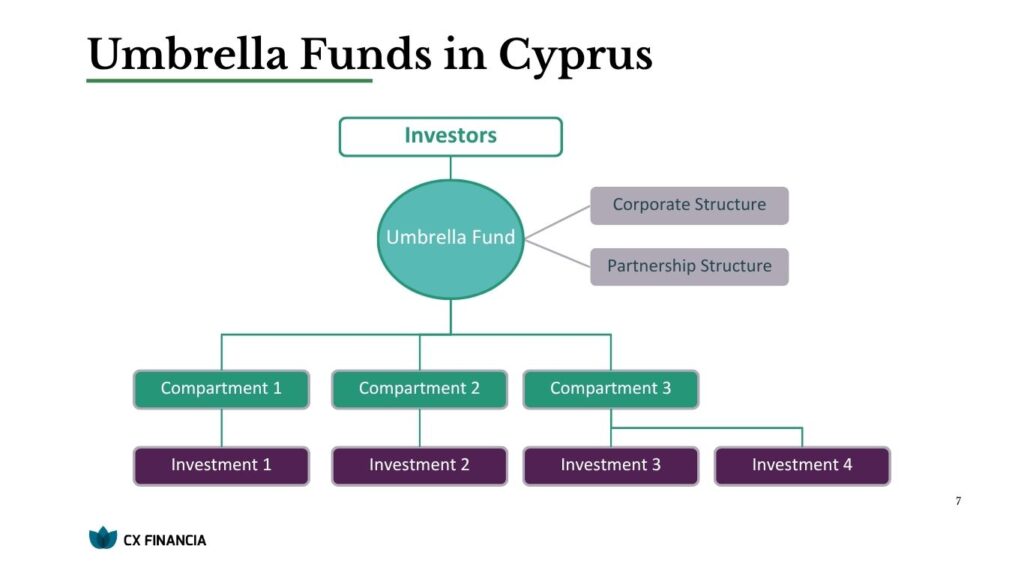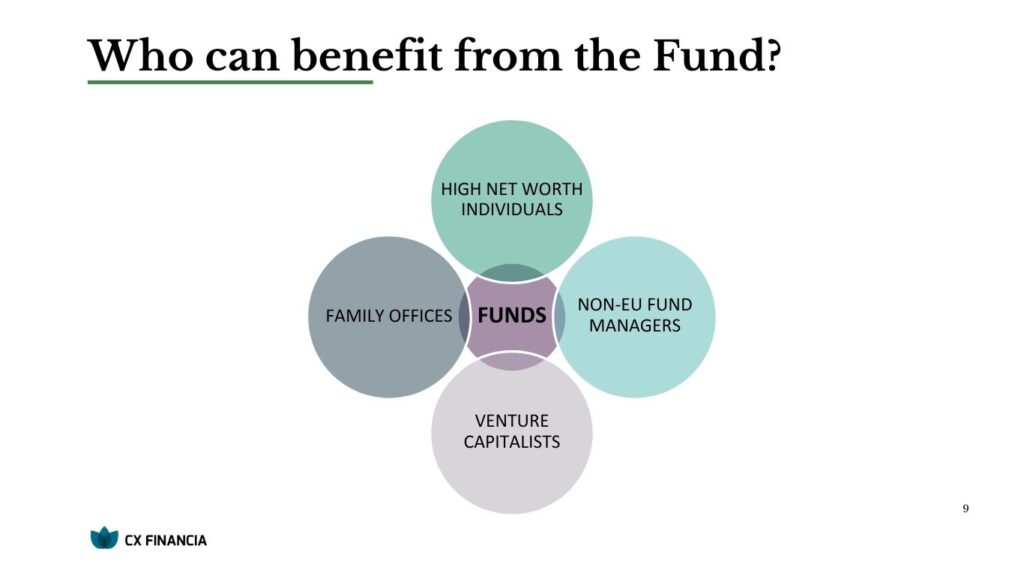Cyprus is increasingly recognised as a preferred jurisdiction for setting up investment funds within the EU. Among the available structures, Alternative Investment Funds (AIFs) have become the most widely used fund type in Cyprus, offering flexibility, cost efficiency, and access to EU investors. But what exactly is an AIF—and why are so many fund managers choosing Cyprus as their base?
An AIF is characterized as a collective investment fund designated for raising external capital from several investors with a view to investing funds in favor of those investors according to a defined investment policy.
Under Cyprus law, there are two distinct types of investment funds: (a) Alternative Investment Funds (“AIF”) and (b) Undertakings for Collective Investment in Transferable Securities (“UCITS”), both of which are regulated by the Cyprus Securities and Exchange Commission (“CySEC”).
With Cyprus continuing to strengthen its appeal as an alternative fund jurisdiction, We witness positive attitude from asset managers toward Cyprus as a new robust and flexible fund and asset management jurisdiction allowing Cyprus as a market to continue to grow, with new funds being raised and new promoters interested in bringing their business to Cyprus

In this article CX Financia will explain some key facts about the most common type of funds used in Cyprus, the (AIFS) alternative investment funds -how they work, who they suit, and what makes them a strategic choice for fund managers and investors alike.
Table of contents
- What Type of Investor Typically Chooses Cyprus for Investment Fund Setup?
- Why Set Up an Investment Fund in Cyprus? Key Benefits vs Other EU Jurisdictions
- Types of AIFs in Cyprus
- What are the Legal Structures of an AIF in Cyprus?
- What Is an Umbrella Fund?
- Regulatory and Organisational Requirements
- Tax Benefits of AIFs in Cyprus
- Stakeholders in a Cyprus-Based AIF
- Enactment of the Fund Administrators Law in Cyprus
- Who Should Set Up an Investment Fund in Cyprus?
- How CX Financia Can Help?
What Type of Investor Typically Chooses Cyprus for Investment Fund Setup?
There are three type of investors that mostly choose Cyprus to set up an investment fund: (a) Professional Investors, (b) Well-informed Investors or Eligible Counterparties, and (c) Retail Investors.
Professional Investors are those investors who possess the experience, knowledge and expertise to make their own investment decisions and duly assess the risk those investment decisions incur.
Well-Informed Investors or Eligible Counterparties are those investors who are not considered as professional investors and must confirm in writing that they are qualified investors aware of the risks involved with an investment in the relevant AIF and make an investment of at least €125,000 or have been evaluated by a licensed bank/credit institution, an authorised investment firm or an authorised management company as having expertise, experience and knowledge in evaluating the suitability of an investment opportunity.
Retail investors are those investors who do not meet either the requirements of being categorized as a Professional Investor or as a Well-Informed Investor/Eligible Counterparty.
Why Set Up an Investment Fund in Cyprus? Key Benefits vs Other EU Jurisdictions
Cyprus offers several advantages over other EU fund hubs, making it an attractive destination for fund managers, family offices, and cross-border investors. Being an EU member state and a Eurozone member, compliant with EU laws, standards, directives and regulations, Cyprus is one of the fastest growing centers of investment funds in Europe due to the continuous development of its legal and financial regulatory framework.Moreover, Cyprus has successfully positioned itself as a competitive and cost-effective fund jurisdiction in Europe, leveraging:
- A fully transposed EU AIFMD framework
- English-based legal infrastructure
- Competitive taxation
- Professional services with international pedigree
As a result, Cyprus has become popular for AIF setups. This appeal is particularly strong for non-EU managers aiming to gain seamless access to EU passporting opportunities, while benefiting from an agile and cost-efficient regulatory environment.
“Cyprus combines its proven tax regime with a flexible fund legislation and half a century of international financial services experience.”
Investors are offered a quite favorable EU and OECD-approved tax regime and tax planning opportunities, as there are no specific tax requirements with respect to the Cypriot AIFs and UCITS. The above investment funds enjoy all of the tax advantages offered by the Cypriot tax legislation in comparison to other EU countries, which include, inter alia, double taxation treaties with over 65 countries worldwide worldwide allowing for tax efficient structuring of investment.Moreover Cyprus-based funds and asset managers benefit from low tax burdens levied on Cyprus-based corporations and provides incentives and tax benefits for high-earning managers and high-net-worth individuals.
Types of AIFs in Cyprus
Cyprus offers three core AIF structures under CySEC supervision—each tailored to different investor needs and compliance obligations.
- There are three types of Alternative Investment Funds that can be set up in Cyprus:
- the Alternative Investment Fund of unlimited number of investors (AIF)
- the Alternative Investment Fund of Limited Number of Investors(AIFLNP),
- and finally the Registered Alternative Investment Fund (RAIF).
It is important to note for AIFLNP investors may not exceed the total number of 50,whereas for AIFs and RAIFs number of Investors can be unlimited.
Investment restrictions may apply according to the type of the AIF
Finally RAIFs in Cyprus are do not require licensing by CySEC but require to be managed by a regulated external manager.
RAIFs are registered Within one month from submission of the relevant notification package to CySEC to confirm the registration of the RAIF and allow the raising of capital.

- AIFUNPs are suitable for large-scale retail fundraising.
- AIFLNPs target smaller groups of experienced investors
- RAIFs, the most flexible and efficient, benefit from fast market entry as they are not directly authorised by CySEC but must be managed by a licensed AIFM.
Learn more about the regulatory requirements in our CySEC licensing process guide.
What are the Legal Structures of an AIF in Cyprus?
The legal framework governing the licensing and operation of AIF entities in Cyprus is primarily outlined in the Alternative Investment Funds Law of July 2018. Cyprus AIFs can be set up as:
• Common Funds
• Investment Companies (with fixed or variable capital)
• Limited Partnerships (with or without legal personality)
What Is an Umbrella Fund?

A key innovation in Cyprus’s fund framework is the ability to establish umbrella funds, where a single fund can include multiple distinct investment compartments (sub-funds), each operating independently in terms of assets and liabilities. This setup provides a cost-effective and flexible structure for fund promoters.
Umbrella funds offer significant advantages to both fund managers and investors:
- Investors can switch between compartments without triggering regulatory burdens
- Each compartment can pursue its own investment strategy, asset allocation, and investor base
- Each compartment is ring-fenced and segregated from the umbrella and other sub-funds
- Investor rights are strictly limited to the assets of their chosen compartment
- •Compartments can be dissolved independently without affecting the entire umbrella structure
- •Set-up and running costs are generally lower compared to launching multiple separate funds
This model is especially attractive for fund platforms, multi-strategy managers, and promoters targeting various investor segments under a unified legal entity.
Each compartment can pursue a different strategy and cater to a different investor profile—making umbrella funds especially attractive for fund platforms and multi-strategy managers.
Regulatory and Organisational Requirements
Regardless of the AIF type—whether internally or externally managed,Cyprus law imposes common standards for how funds must be organised and operated.
Fund promoters must navigate CySEC’s licensing regime, which includes:
1. Clearly Defining the funds structure and investment policy
2. Appointing directors and fund service providers
3. Submitting application package with offering documents, policies, manuals
4. Ensuring risk management, compliance, AML controls
5. Raise a minimum level of capital within the first 12 months (excluding capital commitments); this obligation applies on a per-compartment basis in the case of an umbrella AIF.
Depending on the AIF structure, licensing timelines vary. For example CySEC typically reviews complete applications within six months. For RAIFs, approval can be obtained within 4–6 weeks post-registration. For a detailed walkthrough of the required documentation, timelines, and approval stages, see our guide to the CySEC licensing process.
Tax Benefits of AIFs in Cyprus
Cyprus offers one of the most attractive tax frameworks in Europe, appealing to both institutional fund promoters and individual investors.
The key tax features include:
• 12.5% Corporate Income Tax: This flat rate is among the lowest in the EU, allowing funds structured as Cyprus tax-resident companies to operate efficiently.
• No Capital Gains Tax on Securities: Profits from the sale of shares, bonds, fund units, and other qualifying titles are fully exempt from capital gains tax.• No Withholding Tax: Dividends paid to non-Cyprus tax residents are not subject to any withholding tax, making it easier for international investors to repatriate returns.
• Notional Interest Deduction (NID): Companies, including AIFs, can benefit from a deemed interest deduction on new equity, reducing taxable income by up to 80% in some cases.
• No Controlled Foreign Company (CFC) Rules or Thin Capitalisation Restrictions: This flexibility offers international structuring benefits, especially for high-net-worth investors or family offices.
In the case of umbrella funds, each sub-fund is treated as a separate taxpayer, despite all compartments being housed under a single legal structure. This offers tax segregation, operational flexibility, and better risk management.
For example, a venture capital fund based in Cyprus investing in early-stage fintech startups could reinvest gains without triggering immediate tax liabilities, while distributing returns tax-free to foreign investors.
Stakeholders in a Cyprus-Based AIF

In broad terms, there are three key players involved in any investment fund setup:
- Unitholders (Investors)
- Fund Manager (AIFM or internally managed)
- Depositary (custody and oversight of fund assets)
- Fund Administrator (NAV calculation, reporting, compliance)
1. Investors (Unitholders)
These are the individuals or institutions who contribute capital to the fund. Much like shareholders in a company, unitholders gain ownership in the fund by purchasing units. They are entitled to returns based on the performance of the fund’s underlying assets, but do not typically engage in day-to-day decision-making.
2. The Fund Management Company
Often referred to as the fund manager, this entity is responsible for the day-to-day management and strategic investment decisions of the fund. While each fund is assigned one manager, a single management company may oversee multiple funds. Their role also includes administrative oversight and ensuring compliance with regulatory obligations.
3. The Fund Depositary
This third-party institution safeguards the fund’s assets and ensures proper custody and recordkeeping. Depositaries can include licensed banks, savings institutions, or other authorised financial entities. Their role is crucial in maintaining trust and transparency, as they also monitor compliance and asset valuation.
4. The Fund Administrator
The fund administrator is a critical operational player responsible for the fund’s back-office duties. This includes calculating the Net Asset Value (NAV), preparing financial statements, performing regulatory reporting, maintaining investor registers, and facilitating communication between stakeholders. Administrators act as a key player in ensuring smooth operational accuracy and compliance across all fund activities. In many cases, outsourcing to a licensed administrator is a cost-effective way for managers to meet complex regulatory obligations without scaling internal teams.
Enactment of the Fund Administrators Law in Cyprus
Building on the vital role fund administrators play in Cyprus’s investment ecosystem, the recent enactment of the Investment Fund Administrators (IFA) Law marks a major step forward in closing long-standing regulatory gaps. It aligns local standards with leading EU fund hubs and strengthens Cyprus’ position as a credible international centre for fund services.
Some of its key provisions include:
- Mandatory licensing: Third-party administrators offering services such as NAV calculation, investor registry, and processing of subscriptions/redemptions must now obtain a CySEC license.
- Exemptions: In-house administration by fund managers licensed under AIFM or UCITS rules is exempt from the standalone licensing obligation.
CX Financia will explore the full impact of this law, including licensing procedures and operational implications, in a dedicated article.
Who Should Set Up an Investment Fund in Cyprus?
Funds are traditionally used to finance large scale investments like real estate, shipping, and venture capital. But what type of investor typically benefits from setting up a fund in Cyprus?
Funds are considered as vehicles which operate under more strict and transparent rules than normal limited liability companies, which give the ability to raise capital from private and institutional investors who are not really interested in being involved in the day to day management of their investment but seek a good return on their investment in accordance with the risk they chose to undertake. Funds are traditionally being used as an alternative method to bank financing .It is also one of the most widely used vehicle from venture capitalists whose investments may need extra funding.
Cyprus is suitable for:

Family offices and wealth managers
Cyprus AIFs are a strategic choice for family offices managing generational wealth ,who want to manage assets in a structured, professional way, especially where investment strategies are shared among different family members or unrelated participants.
Venture Capital Firms and Startup Investors
Venture capital firms that pool funds from high-net-worth individuals and invest in a variety of early-stage businesses, from tech startups to biotech and alternative finance platforms. These firms typically have the ability to structure funds flexibly and benefit from Cyprus’s favourable tax regime which make it cost-effective for backing innovation.
High Net Worth Individuals (HNWIs)
HNWIs looking to protect assets and optimise taxes. Instead of using traditional holding companies, many are shifting to fund vehicles that offer regulated management, better risk control, and tax transparency.
Non-EU managers
Non-EU managers seeking access to the European capital markets. By partnering with a licensed EU AIFM, they can distribute their funds across the EU through passporting rights without setting up a full European operation.
The flexibility and protection offered make Cyprus AIFs an appealing alternative to traditional holding vehicles, especially for cross-border fund managers, private wealth planners, and institutional investors
How CX Financia Can Help?
CX Financia offers end-to-end support for Investment Fund licensing through a dedicated team with deep expertise in fund authorisation and registration. We guide you in selecting the most suitable AIF or AIFM structure tailored to your business model and strategic goals.
We offer end-to-end support for:
• AIF and AIFM license applications
• RAIF setup and structuring
• Fund administration and compliance services
• Regulatory Compliance support
Our experienced team works with legal counsels, banks, and custodians to expedite your fund setup while ensuring full regulatory compliance.If you’re preparing to navigate CySEC approvals, explore our full CySEC licensing process advisory support
“We combine local expertise with global standards to deliver timely, efficient licensing support.”
Contact CX Financia to explore your licensing options in Cyprus

